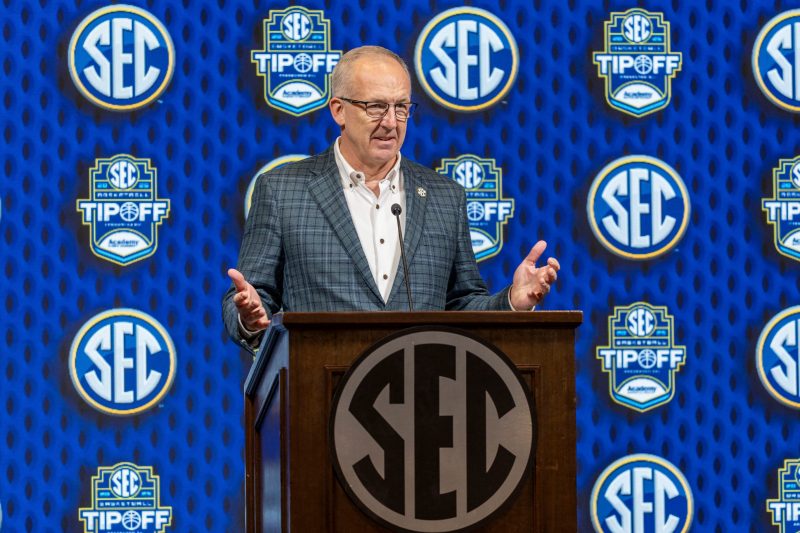MIRAMAR BEACH, Fla. – SEC commissioner Greg Sankey bristles at the idea that he’s a college sports villain.
So, don’t be the villain then. Be the hero the College Football Playoff needs.
A man who’s hailed as college sports’ most powerful figure ought to flex his muscle to land a playoff format that both suits the SEC’s needs, while remaining an open-access tournament, rather than stand by and let the playoff morph into a rigged SEC/Big Ten invitational.
The playoff’s undecided format for 2026 and beyond is the subject of much debate here this week at the SEC’s spring meetings.
The conversation centers on two models featuring 16 teams. One model comes off as a sham. The other seems like a fairer format good for any top team, regardless of conference affiliation.
In the sham corner, there’s the 4+4+2+2+1 model loaded with 13 auto bids, plus three at-large selections. Auto bids would be preassigned to conferences before the season kicks off, with four apiece going to the Big Ten and the SEC, two going to the Big 12 and ACC, and one going to the top remaining conference champion. Some risk-averse Big Ten and SEC athletic directors support this structure. Most everyone else sees this model for what it is: a farse that predetermines bids based on a conference’s brand and reputation instead of in-season meritocracy.
In the other corner, there’s the open-access 5+11 model that divvies up five auto bids to the top conference champions and leaves 11 at-large bids up for grabs. SEC coaches took a shine to this model during their meetings here on Tuesday, Sankey said.
“At the coaching level, the question is, why wouldn’t that be fine? Why wouldn’t we do that?” Sankey said of the 5+11 model.
Great questions. There’s no good reason the SEC shouldn’t embrace this model, if only athletic directors could reject the allure of preassigned bids.
SEC coaches prefer playoff model with more at-large bids
SEC coaches, Sankey said, trust their teams’ ability to earn at-large bids.
To wit, Ole Miss coach Lane Kiffin rejects the need for auto bids. He prefers a 16-team model designed to select the best teams, regardless of conference.
Georgia’s Kirby Smart, too, offered support for a playoff in which teams could hunt bids rather than have them preassigned based on affiliation.
Would controversy surround at-large bids? Sure, but that’s nothing new. Controversy accompanies postseason selections across NCAA sports. Somebody will feel “snubbed,” but that’s preferrable to preassigning bids based on conference clout.
More clarity would be needed to determine how strength of schedule is calculated and how much it’s weighted during the selection process. There’s time to hammer out that strength of schedule piece in the coming months.
This 5+11 model leaves a mathematical path for the SEC – or any other conference – to claim as many as 12 playoff bids.
The auto-bid model, by comparison, would restrict the SEC from accessing nine of the 16 bids. And yet, some SEC athletic directors just can’t seem to resist the carrot of the conference being guaranteed four bids, even if that goes against coaches’ apparent desire to leave more spots up for grabs to access through performance combined with strength of schedule.
The auto-bid model reportedly enjoys strong support within the Big Ten. In fact, the idea seems to have originated from there.
The SEC and Big Ten wield the power to shape the playoff’s future format. Sankey has forged a warmer relationship with Big Ten commissioner Tony Petitti than he had with Petitti’s predecessor, but this playoff debate isn’t the time for Sankey to cede the floor to his Big Ten buddy.
This moment calls on Sankey to assert his leadership to craft a playoff format that’s good for the SEC, but without being rigged against other conferences with a stacked auto-bid system.
May the best teams earn the bids, rather than the most powerful conferences be preassigned the bids.
Greg Sankey was once a college sports hero. Can he reprise role?
Sankey’s been the hero once before. He saved the college football season in 2020, amid the COVID pandemic. That August, the Big Ten and Pac-12 initially opted to cancel their seasons. Sankey decided the SEC would play. The Big Ten and Pac-12 came to heel.
Sankey’s leadership during the pandemic remains his finest hour.
In the years since, Sankey moved to strengthen his conference’s position, even if those moves challenged what might be good for college sports on the whole. The SEC’s additions of Oklahoma and Texas ignited another round of conference realignment that weakened some conferences while the SEC and Big Ten grew in size and strength. Sankey repeatedly suggested March Madness needed reimagined, remarks that aged like milk on the pool deck of a beach resort. He’s verbally sparred with fellow commissioners.
Sankey took a villainous turn since the pandemic. He’s not a lone wolf. Petitti operates behind the curtain for a stacked-deck playoff, but that doesn’t mean Sankey and his conference must embrace this auto-bid plan. To hear SEC coaches tell it, they don’t even want this crock of a 4+4+2+2+1 auto-bid format.
Here’s Sankey’s chance to denounce this auto-bid sham, resist the elitist invitatinal, and steer an open-access format to the finish line.
Cast aside the black hat, and be the fair-minded hero this playoff debate needs.
Blake Toppmeyer is the USA TODAY Network’s national college football columnist. Email him at BToppmeyer@gannett.com and follow him on X @btoppmeyer.

